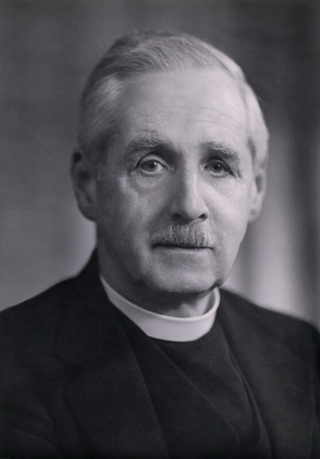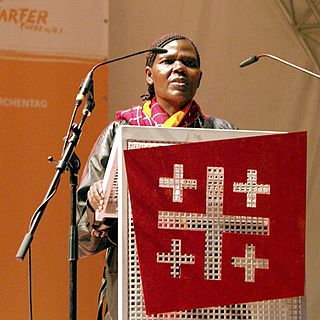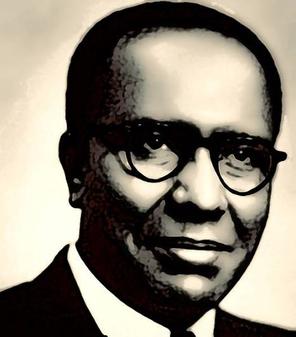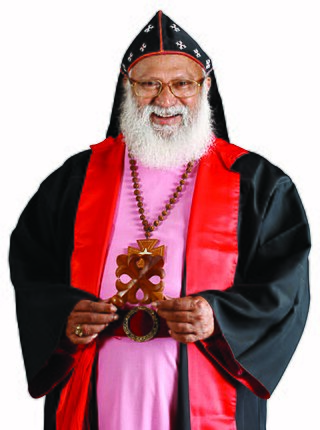Related Research Articles

The World Council of Churches (WCC) is a worldwide Christian inter-church organization founded in 1948 to work for the cause of ecumenism. Its full members today include the Assyrian Church of the East, the Oriental Orthodox Churches, most jurisdictions of the Eastern Orthodox Church, the Union of Utrecht, the Lutheran churches, the Anglican Communion, the Mennonite churches, the Methodist churches, the Moravian Church, Mar Thoma Syrian Church and the Reformed churches, as well as the Baptist World Alliance and Pentecostal churches. Notably, the Catholic Church is not a full member, although it sends delegates to meetings who have observer status.

Ecumenism – also called interdenominationalism, or ecumenicalism – is the concept and principle that Christians who belong to different Christian denominations should work together to develop closer relationships among their churches and promote Christian unity. The adjective ecumenical is thus applied to any interdenominational initiative that encourages greater cooperation and union among Christian denominations and churches.

The World Evangelical Alliance (WEA) is an interdenominational organization of evangelical Christian churches, serving more than 600 million evangelicals, founded in 1846 in London, England, United Kingdom to unite evangelicals worldwide. WEA is the largest international organization of evangelical churches. The headquarters are in Deerfield, Illinois, with UN offices in New York City, Geneva, and Bonn. It brings together 9 regional and 143 national evangelical alliances of churches, and over one hundred member organizations. Moreover, the WEA includes a certain percentage of individual evangelical Christian churches. As of March 2021, the Secretary General of the WEA is German theologian Thomas Schirrmacher.
Arthur Judson Brown was an American clergyman, missionary and author.

The 1910 World Missionary Conference, or the Edinburgh Missionary Conference, was held on 14 to 23 June 1910. Some have seen it as both the culmination of nineteenth-century Protestant Christian missions and the formal beginning of the modern Protestant Christian ecumenical movement, after a sequence of interdenominational meetings that can be traced back as far as 1854.

John Baillie was a Scottish theologian, a Church of Scotland minister and brother of theologian Donald Macpherson Baillie.

Archbishop Anastasios of Tirana, Durrës and All Albania is the Archbishop of Tirana, Durrës and All Albania and as such the primate and Head of the Holy Synod of the Autocephalous Orthodox Church of Albania. He was elected in June 1992. Professor Emeritus of the National University of Athens. Honorary Member of the Academy of Athens. Anastasios is one of the presidents of the Central Committee of the World Council of Churches. He is also the honorary president of the World Conference of Religions for Peace.
Jesse Moren Bader (1886–1963) was a 20th-century evangelist, ecumenist and global leader. He was a significant and visionary leader during the twentieth century, not only within his own communion, helping establish the World Convention of Churches of Christ but also within the wider church. This influence was not limited to the United States of America but extended to the Christian world.

Philip Alford Potter was a leader in the Methodist Church and the third General Secretary of the World Council of Churches (1972–1984).
Lukas Vischer was a Swiss Reformed Theologian. From 1961 he was Research Secretary of the World Council of Churches’ (WCC) Faith and Order Commission in Geneva and from 1966 until 1979 the Commission’s Director. From 1980 until 1992 he headed the Protestant Office for Ecumenism in Switzerland and taught Ecumenical Theology at the Theological Faculty of the University of Bern. From 1982 until 1989 he was moderator of the World Alliance of Reformed Churches’ (WARC) Theology department and from 1982 until 2008 moderator of the John Knox International Reformed Centre’s Programme Commission in Geneva. In these years, ecological responsibility of the Churches became a focal point of his work.
John A. Mackay was a Presbyterian theologian, missionary, and educator. He was a strong advocate of the Ecumenical Movement and World Christianity.
The Lausanne Committee for World Evangelization, more commonly known as the Lausanne Movement, is a global movement that mobilizes Christian leaders to collaborate for world evangelization. The movement's fourfold vision is to see 'the gospel for every person, disciple-making churches for every people and place, Christ-like leaders for every church and sector, and kingdom impact in every sphere of society'.
Christianity in the 20th century was characterized by an accelerating secularization of Western society, which had begun in the 19th century, and by the spread of Christianity to non-Western regions of the world.

Agnes Regina Murei Abuom was a Kenyan Christian organisational worker who served as moderator of the Central Committee of the World Council of Churches (WCC) since 2013. She was the first woman and the first African to hold this post. She represented the Anglican Church of Kenya.
The International Association for Mission Studies (IAMS) is an international, inter-confessional, and interdisciplinary professional society for the scholarly study of the Christian mission and its impact in the world and the related field of intercultural theology. It is based in England and South Korea.
The Tell Scotland Movement (1953-1966) was the most extensive and ambitious attempt at outreach by the Protestant Churches in Scotland in the twentieth century. At the time, together with its associated All-Scotland Crusade, led by Dr Billy Graham, it generated considerable energies, publicity and controversy. In 1964 Tell Scotland became a founding part of the Scottish Churches Council, within the ecumenical movement. Commentators since have had varied views about the extents to which Tell Scotland succeeded or failed.
The National Council of Congregational Churches of the United States was a mainline Protestant, Christian denomination in the United States. Its organization as a denomination was delayed by the Civil War. Congregational leaders met again in Boston, Massachusetts in 1865, where they began to hammer out standards of church procedures (polity) and adopted a statement of faith, known as the Burial Hill Declaration. Denominational organization came in 1871 with formation of the National Council of Congregational Churches, which existed until its merger in 1931. In 1928, there were 5,497 Congregational churches in the U.S. with a membership of 939,130. These churches were served by 5,648 ministers.

Christian Gonçalves Kwami Baëta was a Ghanaian academic and a Presbyterian minister who served as the Synod Clerk of the Evangelical Presbyterian Church of the Gold Coast from 1945 to 1949. He was among a number of prominent individuals, corporate organisations and civil society groups that were instrumental in the establishment of the University of Ghana, Legon in 1948.
Emilio Castro was a Methodist minister from Uruguay. He served as general secretary of the World Council of Churches from 1985 to 1992.

Zacharias Mar Theophilus was the Suffragan Metropolitan of the Mar Thoma Syrian Church. The Mar Thoma Syrian Church is believed to be established by St Thomas, The Apostle of Jesus Christ and is believed to be the continuation of the ancient Christian community of India.
References
- ↑ Hogg, William R. (2002). Ecumenical Foundations: A History of The International Missionary Council and its Nineteenth-Century Background. Wipf and Stock Publishers. ISBN 978-1-59244-014-6.
- ↑ Arthur P. Johnston, World Evangelism and the Word of God, Bethany Fellowship, 1974.
- 1 2 "History". World Council of Churches. Retrieved 31 August 2020.